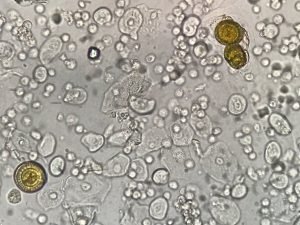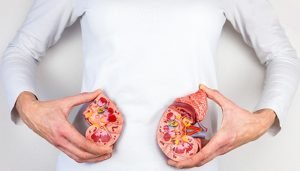If you have crystalluria or what is simply known as cloudy urine, the chances for it being caused by cholesterol crystals are relatively lower.
Different types of crystals can form in the urine of even healthy individuals for a variety of reasons, that are generally harmless.
Cholesterol Crystals In The Urine
Contents

If the crystals are cholesterol lipids then it may be the indication of certain other diseases in your body.
So, prompt diagnosis and treatment are essential because serious complications of cholesterol crystals in the urine may include kidney damage that could even lead to complete kidney failure.
Cholesterol crystals look like long rectangles with cut-out corners and are usually observed after a certain urine sample has been refrigerated.
Although they can be found in both neutral and acid urine, their occurrence is rare except in severe kidney diseases such as renal tubular disease. Or, when a lymphatic vessel ruptures into the renal pelvis.
Diagnosis And Treatment For Cholesterol Crystals In The Urine

Similar to most other kinds of urine crystals, the diagnosis and treatment methods are pretty much the same.
A urine test effectively supervised by your physician will identify the type and severity of the disease and the treatment methods required.
Alkali therapy is the most widely used method of treating the direct causes which include diseases such as renal tubular disease.
It involves the inclusion of certain diets and administration of alkaline solutions that are intended to balance out the pH levels of the patients’ urine.
Apart from cholesterol crystals, alkali therapy is recommended for a variety of other urine crystal problems.
All these urine crystallization conditions are collectively known as Crystalluria.
Understanding Crystalluria! What Are The Urine Crystals?
Our urine always contains small traces of chemicals or minerals that are in excessive quantities in our body and is flushed out through the urine.
Excessive sodium, fluoride, potassium, vitamin C, and even protein is flushed out.
Such chemicals or minerals may solidify and form crystals inside the urine. These crystals may be in a variety of forms such as:

Kidney stones can cause excruciating pain in the lower back and abdomen and might include other symptoms such as blood in urine, vomiting, and burning sensation while urination.
Although dietary calcium does not appear to cause kidney stones and may protect against their development, supplemental calcium can be dangerous. There is an observed association between supplemental calcium intake and kidney stone as concluded by the “Nurses’ Health Study” in 2010.
These hexagon-shaped colorless crystals are formed in urine that is very acidic in nature. They are characteristic of a genetic disease called ‘Cystinuria’, which promotes high concentrations of the amino acid cystine in the urine that leads to the formation of cystine stones in the kidneys, ureter, and bladder.
Symptoms may include nausea/vomiting, blood in urine, cramping pain in the urinary tract, and UTIs (urinary tract infections).
These are yellow or dark-colored crystals that look like a bunch of bundled up needles. They are also found in urine that is acidic in nature and may be caused by metabolic disorders such as liver disease or tyrosinemia.
Difficulty gaining weight, fever, diarrhea, bloody stools, and vomiting are the major symptoms of this disease.
Treatment methods include proper exercise routines, following a healthy diet, and taking medications that can treat high blood pressure, cholesterol, and diabetes.
They are usually colorless and appear like 3-dimensional prism-like crystals. High amounts of these kinds of crystals are formed as a result of urinary tract infection with urease-positive bacteria.
Major Risk Factors Associated With Crystalluria
- Dehydration from the low fluid intake is one of the most prominent causes of various stone formations. Without necessary fluids, the body is unable to flush out excessive materials which can solidify over time.
- Individuals living in warm climates are at a higher risk of crystalluria due to frequent fluid loss that is not replenished effectively.
- Some studies show that certain conditions such as Obesity, immobility, and sedentary lifestyles are other leading risk factors of crystalluria.
- Genetic factors also play a part, especially in diseases such as cystinuria that can increase the chances of some people developing crystalluria.
How To Lower Your Chances Of Developing Crystalluria
While there is nothing you can do about your genetic make-up that may be responsible for certain conditions like ‘cystinuria’, you can still lower your chances and avoid most other kinds of urine crystal and stone problems by following some simple daily routines such as: –
- Drinking more fluids:

Proper hydration practices are the key to preventing various renal diseases such as kidney stones.
It helps flush out all the excess and waste materials from your body regularly so that it is harder for the chemicals in your urine to form crystals.
- Cut out excessive protein:
Too much protein in your diet can lead to the formation of crystals in your urine. Make sure your protein intake is matched by some exercise routines to make sure your body utilizes most of the amount you consume.
Also, be very wary of the protein supplements you consume.
- Cut out excessive salt:

Too much sodium in your food is known to cause calcium build-up in your urine that can lead to stones.
It is also known to weaken your bones.
- Avoid vitamin C supplements:
vitamin C supplements are known to cause high amounts of oxalate in the urine. Cut out unnecessary doses of it from your daily routines.
Cholesterol crystals are a very rare occurrence that is usually preceded by a related renal disease or some other complications.
Your physician will be able to detect them easily and provide the best treatment methods available so it is very important to get your urine tested if you notice any cloudiness or irritation during urination.
Drinking a sufficient amount of fluids and working out a good exercise routine will ensure your best chances of avoiding most other kinds of crystalluria.
